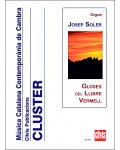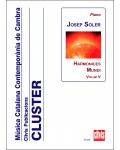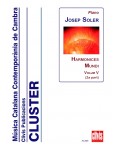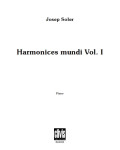
No products
Prices are tax included
Product successfully added to your shopping cart
There are 0 items in your cart. There is 1 item in your cart.
- English
- Castellano
- Català
Josep Soler i Sardà was born in Vilafranca del Penedès in 1935. His musical apprenticeship began here with Rosa Lara, and would continue in Paris with René Leibowitz (1960), and in Barcelona with Cristòfol Taltabull (1960-1964). He has received the “Montecarlo’s Opera Award” (1964), the “Ciutat de Barcelona Award”, twice (1962 and 1978), and the “13rd. Òscar Esplà Award”. His opera Edip and Yocasta premiered in the Gran Teatre del Liceu, in 1986.
In his works, very influenced by the music of Schönberg and Alban Berg, he generally uses the dodecaphonic technique in an expressionistic and impressionistic style, while at the same time becoming more austere and simple.
In the bibliographic world, Josep Soler has written numerous articles and books. From 1977 until 1982, he was a professor of History and Aesthetics at the Barcelona City’s Superior Music Conservatory, and until 1985, a music professor at the same institution. He is currently Director of the Badalona’s Professional Music Conservatory, and Numerary Academician of the Sant Jordi’s Royal Catalonian Academy of the Arts, in Barcelona.
-
-
-
-
-
Gloses del Llibre Vermell
Edition: DigitalThe work is based on a summary of four songs from the Llibre Vermell (Red Book) by Montserrat.
16,50 € -
Gloses del Llibre Vermell
Edition: PrintedThe work is based on a summary of four songs from the Llibre Vermell (Red Book) by Montserrat.
16,50 € -
Harmonices Mundi - Vol. 5
Edition: DigitalHarmonices Mundi deals with the fugue in all its possibilities, often on its own, but also with preludes, associated to dances or within a partita. In this volume, the first five fugues are presented directly (in three or four voices) and it is only in the last piece that the fugue is presented with a prelude.
9,89 € -
Harmonices Mundi - Vol. 5
Edition: PrintedHarmonices Mundi deals with the fugue in all its possibilities, often on its own, but also with preludes, associated to dances or within a partita. In this volume, the first five fugues are presented directly (in three or four voices) and it is only in the last piece that the fugue is presented with a prelude.
17,00 € -
Harmonices Mundi - Vol. 5 2ª Part
Edition: PrintedHarmonices Mundi deals with the fugue in all its possibilities, often on its own, but also with preludes, associated to dances or within a partita. In this volume, the first five fugues are presented directly (in three or four voices) and it is only in the last piece that the fugue is presented with a prelude.
16,00 € -
Harmonices Mundi - Vol. 5 2ª Part
Edition: DigitalHarmonices Mundi deals with the fugue in all its possibilities, often on its own, but also with preludes, associated to dances or within a partita. In this volume, the first five fugues are presented directly (in three or four voices) and it is only in the last piece that the fugue is presented with a prelude.
13,00 € -
-














